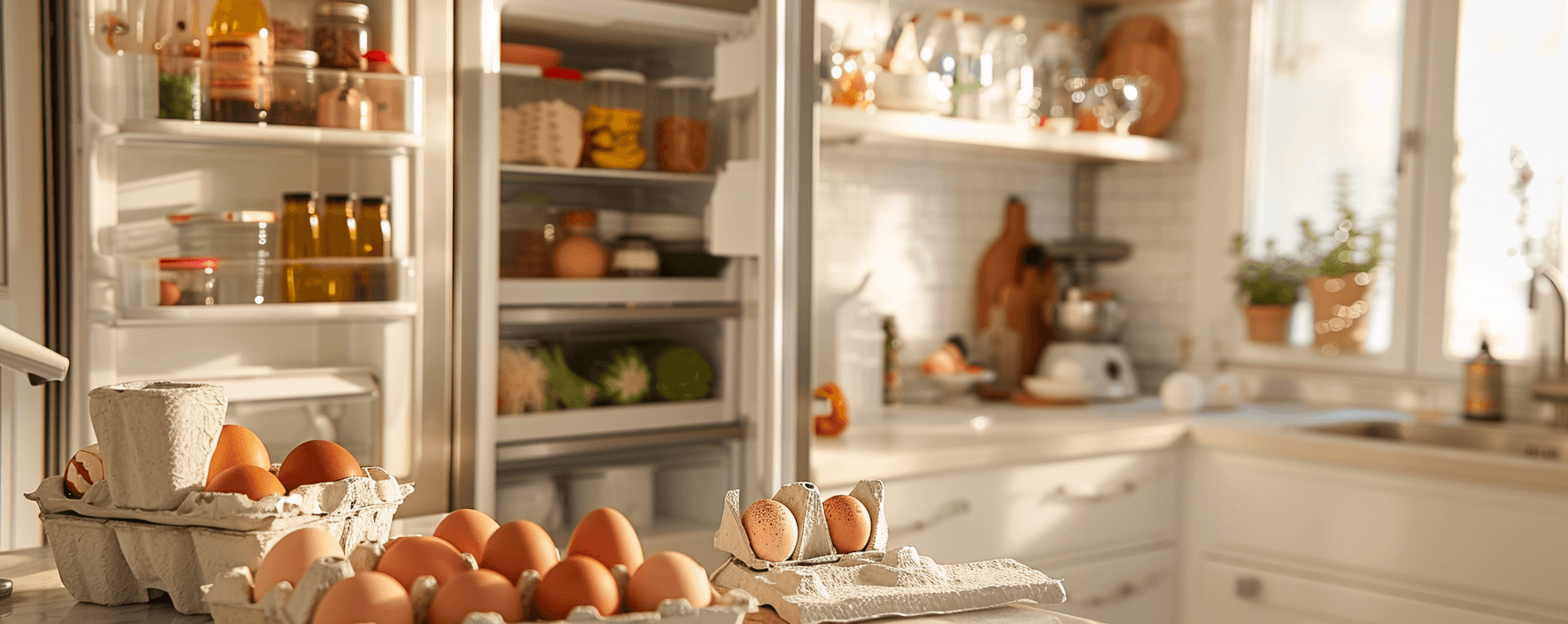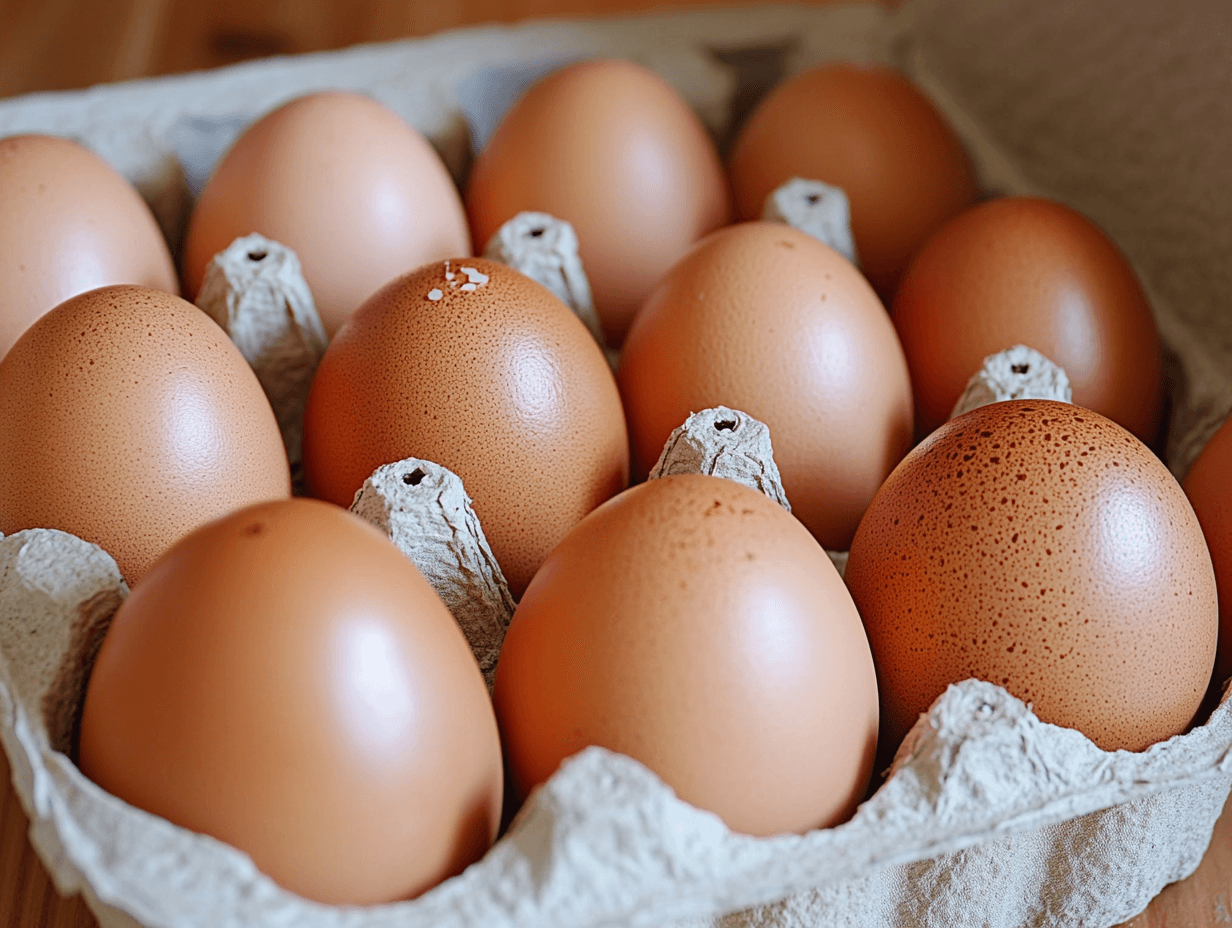Eggs are a versatile ingredient found in many recipes, and knowing how to store them can help prevent food waste and ensure safety. This guide will explore the shelf life of eggs, the necessity of refrigeration, and the best practices for storing various types of eggs.
Refrigerator Storage Time
| Type of Egg/Product | Refrigerator Storage Time | Notes |
|---|---|---|
| Fresh store-bought eggs | 3-5 weeks | Store in original carton on a middle or lower shelf |
| Fresh farm eggs | 2-3 months (unwashed) | Can be stored longer if unwashed |
| Boiled eggs (unpeeled) | Up to 1 week | Store in airtight container |
| Boiled eggs (peeled) | Up to 1 week | Store in airtight container |
| Pickled eggs | 3-4 months | Ensure eggs are fully covered with pickling brine |
| Separated egg whites | 2-4 days | Can be frozen for longer storage |
| Separated egg yolks | 1-2 days | Mix with sugar or salt before freezing |
| Liquid eggs | Follow packaging date | Store according to manufacturer’s instructions |
| Powdered eggs | Up to 10 years (unopened) | Store in a cool, dry place |
| Pasteurized egg products | Follow packaging date | Store according to manufacturer’s instructions |
Fresh Eggs

Fresh eggs, whether store-bought or farm-fresh, have different shelf lives. Store-bought eggs typically last between 3 to 5 weeks in the refrigerator. These eggs have already undergone a washing process that removes the protective bloom, making refrigeration essential to prevent bacterial growth. Farm-fresh eggs, if unwashed, can last up to 2-3 months because the natural bloom remains intact, providing a barrier against bacteria.
To determine if eggs are still good, you can use several simple tests. The float test involves placing an egg in a bowl of water; fresh eggs will sink, while older eggs will float. The sniff test is straightforward – a bad egg will emit a distinct, unpleasant odor. Visual inspection can also help; look for cracks or unusual spots on the shell.
How to Store Eggs
Proper storage techniques can extend the shelf life of your eggs. Always keep eggs in their original carton, which protects them and prevents them from absorbing strong odors from other foods in the fridge. Store eggs on a middle or lower shelf rather than in the door to maintain a consistent temperature. It's crucial to keep the refrigerator at a steady 40°F (4°C).
Is It Necessary to Refrigerate Eggs?

The necessity of refrigerating eggs varies by country due to different processing methods. In the United States, eggs are washed before sale, which removes the protective bloom and necessitates refrigeration to prevent bacterial contamination, particularly from Salmonella. In contrast, European countries do not wash eggs, allowing them to be stored at room temperature safely.
Refrigeration is generally recommended to prevent bacterial growth. However, freshly laid eggs with the bloom intact can be stored at room temperature for up to two weeks, making refrigeration less critical in such cases.
Boiled Eggs

Boiled eggs, whether peeled or unpeeled, have a shorter shelf life than fresh eggs. Both peeled and unpeeled boiled eggs can be stored in the fridge for up to one week. To ensure they remain fresh, store boiled eggs in airtight containers and mark the storage dates on the containers.
Pickled Eggs
Pickled eggs have a longer shelf life due to the preserving nature of the pickling brine. When stored in the refrigerator, pickled eggs can last 3-4 months. It's important to use sterilized jars and ensure the eggs are completely covered with the pickling brine. Avoid storing pickled eggs at room temperature for extended periods to prevent spoilage.
Other Egg-Based Products
Egg whites and yolks, when separated, have different shelf lives. Egg whites can be stored in the fridge for 2-4 days, while yolks last 1-2 days. Both can be frozen for extended storage; however, yolks should be mixed with sugar or salt before freezing to prevent them from gelling.
Commercial egg products such as liquid eggs, powdered eggs, and pasteurized egg products have varying shelf lives. Liquid eggs should be stored according to the expiration date on the packaging, powdered eggs can last up to 10 years if unopened and stored properly, and pasteurized egg products should also be used by their expiration dates.
Conclusion

Proper storage of eggs is essential for maintaining their quality and ensuring they are safe to eat. By following these guidelines, you can maximize the shelf life of your eggs and minimize the risk of foodborne illnesses. Regularly check your eggs for signs of spoilage and always store them appropriately.
FAQs
Can you freeze eggs?
Yes, you can freeze eggs. For whole eggs, beat them until blended before freezing. Egg whites can be frozen as is, while yolks should be mixed with sugar or salt to prevent gelling.
What happens if you eat expired eggs?
Eating expired eggs can lead to foodborne illnesses, with symptoms such as nausea, vomiting, diarrhea, and fever. It's essential to check eggs for freshness before consumption.
How to store eggs without a fridge?
There are methods to store eggs without refrigeration, such as oil coating, water glassing, or using lime water. These methods help preserve the eggs by sealing the pores and preventing bacteria from entering.






